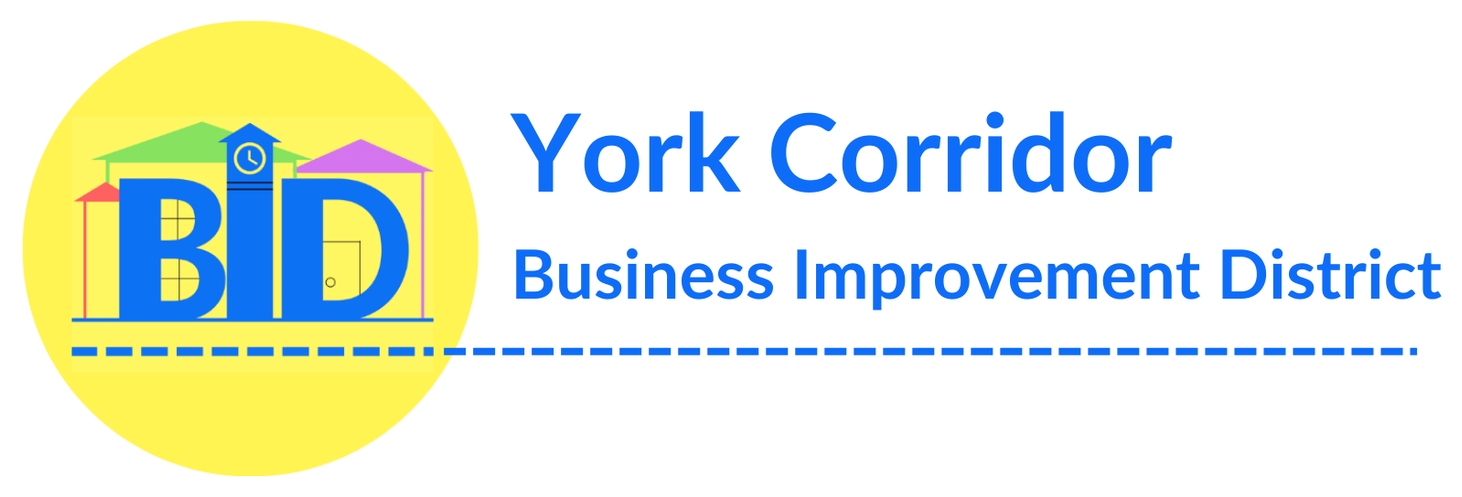
Frequently Asked Questions
Why a BID? Why now?
In community conversations stretching back to 2012, a wide variety of stakeholders have consistently expressed hope for a stronger, more unified, and more vibrant commercial corridor along York Road, where neighbors and visitors happily spend their time and money.
The BID aims to bring this vision to life, laying the groundwork for a vibrant and unified organization of businesses and neighborhoods. The BID brings together both east and west sides, as well as northern, central, and southern segments, to connect businesses and neighborhoods and strengthens the whole Corridor.
After an initial attempt at establishing a business improvement district for the Corridor in 2019, and the intervening pandemic years, the time is well overdue for bringing the community’s broad vision to life. York Road for a long time represented division and segregation, and the hard work of residents, neighborhood organizations, businesses, community leaders, and anchor institutions, has gradually brought more cohesion to the Corridor. The BID is our chance to elevate this work and move York Road into its next chapter, one of intentional, equitable growth and sustained economic vitality.
How is the BID funded?
Once established, the York Corridor Business Improvement District will be a legislated area in which property owners pay a surcharge on Baltimore City property taxes. The surcharge is calculated at 22 cents per $100 of assessed property value, meaning that a property assessed at $400,000 (close to the average value along the Corridor) would have a BID surcharge of $880 annually, or $440 paid twice per year. This fee rate is relatively fixed; annual increases are not the norm for city benefits districts and are not anticipated for the Corridor.
Unlike property taxes, which go towards a wide variety of civic services across the City, the BID property tax surcharge is exclusively for supporting the York Corridor. All fees collected are funneled directly to the BID.
Note that exempt businesses are non-profits, governmental buildings, and religious institutions that do not pay property taxes, as well as exclusively residential properties.
What will the BID change along the Corridor?
The groundwork is laid so that once the BID is established, new initiatives will begin quickly along the Corridor.
One noticeable addition at first will be clean and green staff, who will be wearing bright BID attire and attending to the York streetscape in many ways, ranging from emptying public trash cans to planting trees, from assisting in proper bulk trash removal to clearing leaves from gutters, and much more.
You’ll start to see other tangible improvements, like quicker identification of a vacant property from a commercial code specialist’s support, or a safety audit leading to additional street lighting to help with evening visibility, or quarterly forums on topics of business owner interest hosted by community leaders or expert guests.
Finally, the BID will organize and advocate on behalf of business owners along the Corridor, and while you can’t “see” this as you walk York Road, you can expect problems to get addressed more quickly, and broader coordination among businesses and stakeholders. The BID will also apply for federal, state, and city grants to support businesses, involvement in new initiatives, and new tools and platforms helping support the neighborhood.
How will the BID address safety and security?
The BID board recognizes safety and security are a priority for business owners and patrons. The BID Executive Director is expected to be in partnership with the community regarding safety and security concerns. The BID has the ability to coordinate seeking services, applying for funding, and/or creating new safety initiatives in response to business needs.
How is the BID staffed?
An Executive Director will be hired by and report to the BID Board of Directors. This leader will oversee the implementation of all BID work, including serving as a full-time point of contact for corridor properties, proactively addressing issues and concerns, supervising the Clean and Green team, and partnering with city agencies, funders, community leaders, and others to develop resources and move forward district improvement projects.
The Clean and Green team will be a daily presence on the Corridor and charged with cleaning well above and beyond what regular city services are already provided. Clean and Green worker responsibilities will include: cleaning public walkways and public gutters, emptying corner litter baskets, raking and recycling leaves, shoveling snow, cleaning up commercial corridor alleys, maintaining public green spaces, planting trees and shrubs, and working with the Executive Director (who will work with city agencies) to identify and address other issues like potholes, streetlights, etc.
There may be additional staff positions (i.e. a program manager) depending on the priorities established by property owners, the BID Board, and the Executive Director, and pursuant on additional revenue streams.

